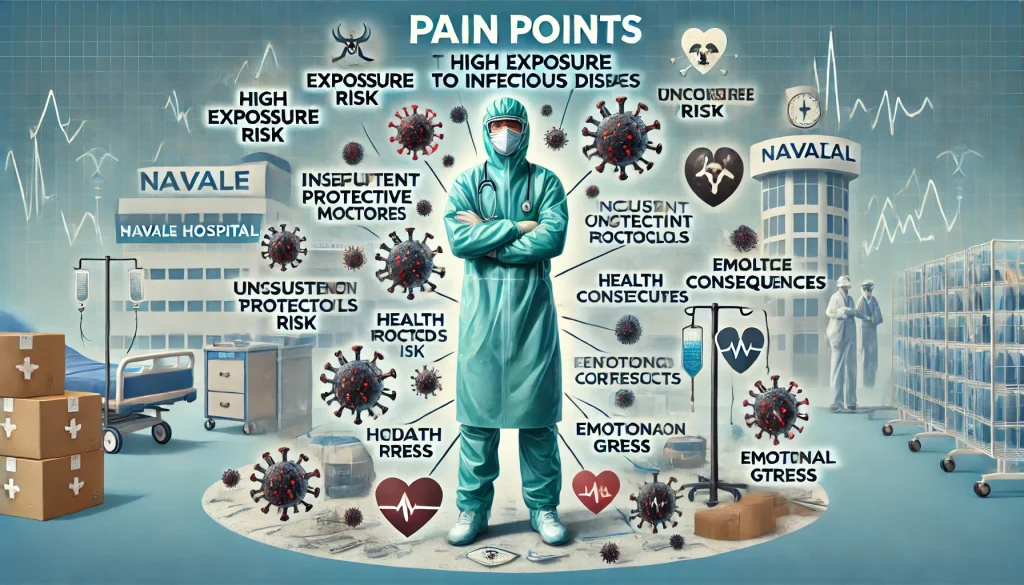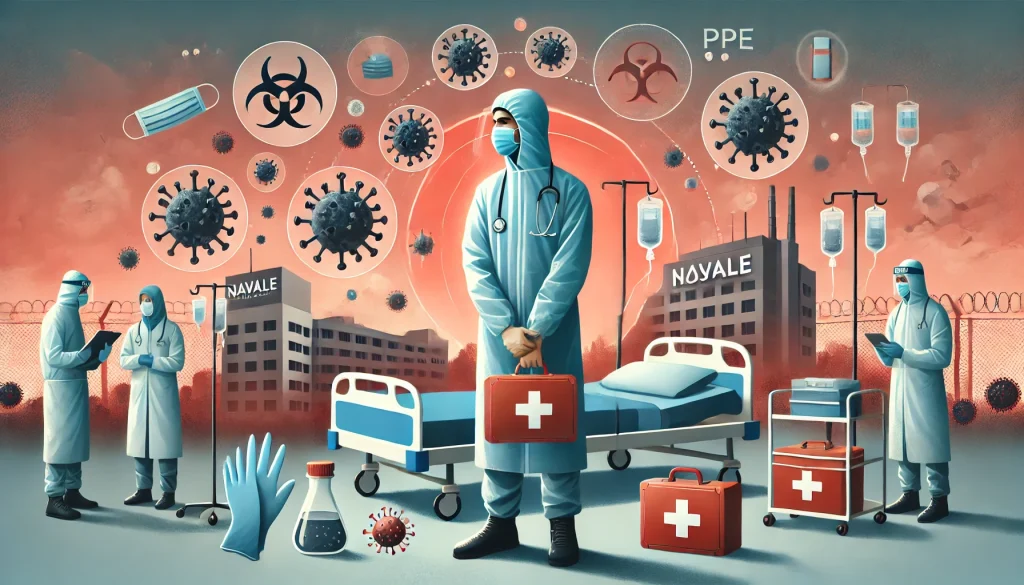Vision behind Noble’s Idea :
Navale Hospital’s vision is to develop a comprehensive platform that enhances infection control measures and protects nurses at Navale Hospital from exposure to infectious diseases. This platform will integrate advanced technologies such as AI-driven protocols, real-time monitoring, and mobile training apps to ensure the highest standards of infection prevention and control.
The platform will provide features such as automated PPE supply management, real-time tracking of hand hygiene compliance, and access to up-to-date training programs. By incorporating innovations like UV-C disinfection and wearable health monitors, we aim to create a safer working environment for nurses, reducing the risk of infection and ensuring their well-being.
Additionally, the platform will facilitate effective communication of updates and changes in protocols, ensuring that all staff members are informed and compliant. By providing these resources and tools, we aim to enhance nurse safety, reduce emotional stress, and improve overall health outcomes in the hospital.
What are the biggest pain points they experience when trying to achieve their goals?
- High Exposure Risk: Frequent and close contact with infectious patients.
- Insufficient Protective Measures: Lack of adequate personal protective equipment (PPE).
- Inconsistent Protocols: Variability in the implementation of safety protocols.
- Lack of Training: Insufficient training on infection control and use of PPE.
- Transmission Risk: Risk of inadvertently transmitting infections to other patients or family members.
- Health Consequences: Potential for serious health issues if infected.
- Workload Pressure: High workload leading to lapses in protocol adherence.
- Emotional Stress: Fear and anxiety related to exposure risks.
- Resource Constraints: Limited access to necessary resources and equipment.
- Communication Gaps: Ineffective communication of updates and changes in protocols.

Innovations that Helps to Solve this Problem:
- UV-C Disinfection: Using UV light to disinfect rooms and equipment.
- AI-Driven Protocols: AI systems that adapt and optimize infection control protocols.
- Smart PPE: PPE with integrated sensors for monitoring usage and effectiveness.
- Real-Time Monitoring: Systems for real-time tracking of hand hygiene compliance.
- Automated Disinfection: Robots and systems for automated room and surface disinfection.
- Wearable Health Monitors: Devices that monitor the health of healthcare workers.
- Mobile Training Apps: Apps providing training on infection control protocols.
- Antimicrobial Coatings: Surfaces treated with antimicrobial agents to reduce infection risk.
- Predictive Analytics: Tools that predict infection outbreaks and suggest preventive measures.
- Remote Health Monitoring: Systems for remotely monitoring the health of nurses and other healthcare workers.
Top 10 Startups Who already Working for this Issue :
- PathSpot: Provides hand hygiene monitoring systems.
- SwipeSense: Offers real-time hand hygiene monitoring and asset tracking.
- VigiLanz: Provides clinical surveillance software for infection prevention.
- SaniNudge: Uses smart sensors to improve hand hygiene compliance.
- CleanSlate UV: Offers UV-C sanitization technology for disinfecting equipment.
- Infection Prevention Technologies: Focuses on automated disinfection systems.
- Xenex: Provides UV room disinfection robots.
- ReadySet Surgical: Manages surgical inventory and sterilization processes.
- ZaaK Technologies: Develops antimicrobial surface coatings.
- Symbiq Health: Offers infection prevention and control software.
Conclusion :
Nurses at Navale Hospital face significant risks due to their frequent and close contact with infectious patients. These risks not only endanger their health but also pose a threat to patient safety and overall hospital operations. Addressing these challenges requires a dedicated platform that enhances infection control measures and ensures adequate protective protocols. By developing a comprehensive platform focused on infection prevention, we can safeguard the health of nurses, reduce the risk of disease transmission, and create a safer working environment. Leveraging advanced technologies and providing essential resources, this platform will set a new standard for nurse safety and infection control in healthcare settings.



